
In April 2013, Ryan Fitzgibbon, launched Hello Mr., an independent magazine in San Francisco, California, with one goal: to tell authentic and meaningful stories about the experiences of “men who date men.”
Over the five years and 10 issues that followed, Hello Mr.became more than a magazine. It quickly grew into a community of misters all around the world who started honest conversations about their interests, loves, hopes, and fears. It was bold, unapologetic and authentically queer.
Though its latest issue is also its last, Hello Mr. says goodbye leaving behind a legacy.
Throughout its run, the magazine inspired other independent LGBTQ publications to follow in its footsteps and gave many people who felt unheard a platform to raise their voice.
How about we take this to the next level?
Our newsletter is like a refreshing cocktail (or mocktail) of LGBTQ+ entertainment and pop culture, served up with a side of eye-candy.
To celebrate the end of an era, HBO held a live reading of Hello Mr.’s 10thand final issue in August at their LGBTQ immersive pop-up activation in Provincetown called The Studio.
After the reading, Queerty caught up with Hello Mr. Founder and Editor-in-Chief, Ryan Fitzgibbon, to discuss the magazine’s history and the impact queer publishing can have on our community – and the world.

Queerty: Congratulations on a fabulous final issue and an incredible 5-year run with Hello Mr.!
Ryan Fitzgibbon: Thank you! It’s been an emotional and incredible experience.
What was the initial inspiration that led you to launch Hello Mr. magazine?
When I started the idea, I was living in the Castro in San Francisco. It was 2011 and it was a very different conversation back then to the conversations we’re having now [about our] community. This was after the passing of Prop 8 and we were at the very beginning stages of the national marriage equality debate. I was around 22 years old at the time, and I remember I felt a bit removed from that because I felt like there was sort of a national agenda to really home in and focus on this issue. So, I wanted to create something that focused a little bit more on the everydayness and the faces within the community I didn’t feel were being represented.
To show that being a queer person is really just about being a person, right?
Exactly. Of course equality is important, but at the same time, I felt there were a lot of personal stories that needed to be told. So, as a graphic designer and a brand designer, I took it as a challenge to create a platform that could reimagine what our community is and could be.
In the contributor guidelines for the first issue of Hello Mr., you encouraged others to be open and honest about queer life, writing, “you have an opportunity to reclaim ownership of what defines you.”
I think we’ve come a lot further from what we were being represented as back then. We didn’t have as much ownership or control over how our image was being used in 2011. The mainstream media was mostly putting out one specific image when they talked about things like Pride, marriage equality, or any of the baseline visuals when it came to representations of our community. I’m glad to see we’re now having a chance to tell more of our stories today – for example, like having a trans person on the cover of Time – but I don’t think we’ll ever be done.
How do you feel the media can improve representation for everyone within our community?
I think stories have to be authentically told by people who are living it and experiencing it. The more we are telling our own stories the more authentic and real it is. I believe that we are so dynamic and such a diverse community that there needs to be a lot of facets and representation from the source. There can’t be governing bodies or single editors deciding what image goes above the fold, for example.
What do you think it means to be out today in the Trump era?
One thing that’s sort of become a catchphrase in our community is “visibility matters.” And it does. It’s really important, but [in the Trump era] I don’t think it goes far enough. We need to be fiercely ourselves and unapologetically ourselves in spaces that aren’t specifically or historically welcoming of us. It’s not only an act of resistance, it’s a way of showing more people our courage and our power and our influence – both within and outside of the community. That’s why being out is so important and what it means to me today.
 Do you remember the first queer magazines that had an impact on you?
Do you remember the first queer magazines that had an impact on you?
Absolutely. Some of the first publications I discovered were Out, The Advocate, and Wink magazine. Then I eventually bought others like Little Joe, which was just a small little magazine I loved about queer film culture. I also had a small private collection of other publications that weren’t always so boldly displayed in my teenage bedroom. (Laughs) But they all really impacted what I thought about the community and they showed me more of what was really out there beyond my small town in Michigan.
Have you heard stories of people who were impacted in a similar way by Hello Mr.?
Definitely! Comments and letters like that from people telling me what Hello Mr. did for them continue to pour in, even now after our final issue. I think that’s because it really resonated with its intended audience in a way that was refreshing to them.
Speaking of your final issue, you had a chance to have a live reading at The Studio, presented by HBO. What did that moment mean to you?
It was a very emotional moment for me, and a proud moment, of course. It felt very cathartic to be in Provincetown and be surrounded by a loving community. This idea that started in the Castro in a gay epicenter on [one end of the country] where people go to feel connected and ending on another [with a reading at The Studio] was very special. It was a full-circle moment.
In the age of the internet, do you think there’s still a place for print publications like Hello Mr. and what do you think the magazine’s end says about the current state of independent LGBTQ publishing?
I think there will always be a place for print publications. Deciding to close Hello Mr. was as much a personal decision as it was anything else and I wouldn’t want that to discourage any young creators from starting their own publications. I don’t want to sound boastful, but I do know and believe the impact that Hello Mr. had. That’s what allowed me to walk away from it feeling accomplished. So, Hello Mr. ending, I don’t think it means all that much really, because there are so many other magazines of various sizes still out there doing a lot of work. Those publications fill niches others can’t and create a bigger impact in smaller ways because they’re affecting the actual communities they’re serving.
What’s next for you?
I don’t know yet, and I’m not sure what I even want that to be. I think my only criteria is, whatever it is, I have to know that it’s something the world needs, and it will add value to people’s lives.

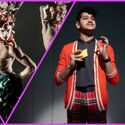


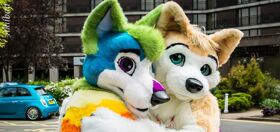

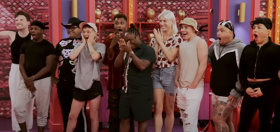


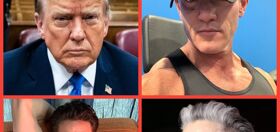



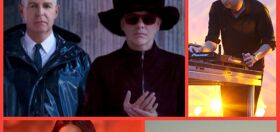






Kangol
So sorry I missed the final reading. *Hello Mr.* had a great run!